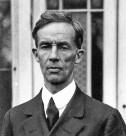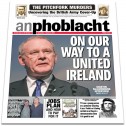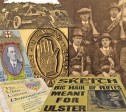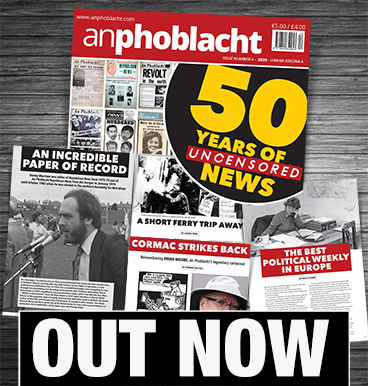The British Labour Party and Ireland
3 February 2013

THE HISTORY of the British Labour Party and its attitude to Ireland has been one of pride and shame, solidarity and betrayal at different times and among the different political tendencies within that very broad-based party. Free article
Pearse’s political journal republished
6 January 2013

PH PEARSE published a political weekly newspaper in the Irish language between March and May 1912. An Barr Bua gave a voice not only to Pearse but to other radical Irish nationalists such as Eamonn Ceannt who, like Pearse, was executed for his part in the 1916 Easter Rising. Here we carry one of Pearse’s articles from An Barr Bua number 2, 23 March 1912. Entitled ‘Will Ireland be sold?’ it has obvious echoes in Irish politics today. Free article
A decade of anniversaries
6 January 2013

THE DECADE of anniversaries is finally upon us – this being specifically the centenary of the Irish revolutionary period of 1913 to 1923. These years wrought enormous political and social change, not only in Ireland but also in the rest of Europe and the world at large. Free article
Partitionist states established
2 December 2012

FOUR DAYS in December 1922 saw tragic events that were the working out of the British Government’s plan to divide and rule Ireland. Partition had been legislated for under the 1920 Government of Ireland Act. At the time of its passing, that Act was a dead letter throughout most of the country, where the Republic had the allegiance of the majority of the people. But in north-east Ulster, the Act led to the establishment of a sectarian Orange state. Partition and the creation of a Six-County state were confirmed in the Treaty that now divided nationalist Ireland. Free article
Irish Bulletin republished
2 December 2012

FOR THE FIRST TIME EVER, the official newspaper of Dáil Éireann, the Irish Bulletin, has been republished. This is a hugely important historical document, chronicling many of the events of the Black and Tan War. Premium service article
Martin McGuinness: ‘A united Ireland is inevitable’
4 November 2012

AN PHOBLACHT last interviewed MARTIN McGUINNESS during his election campaign for President of Ireland. One year on – after coming a very creditable third of seven candidates and winning twice as many votes as Fine Gael’s Gay Mitchell – Martin spoke to us about the political state of play. Free article
Ulster Protestants against Carsonism
4 November 2012

BY THE END OF 1913, the campaign against Home Rule for Ireland organised by the Ulster Unionists and their allies in the Conservative and Unionist Party — better known as the Tories — in Britain had reached a crescendo. The Ulster Volunteers had been established as well as a ‘Provisional Government’, which threatened to seize power if Home Rule became law. Free article
Unionism’s private army
30 September 2012

IN the final part of his series of articles around unionist centenaries, TOM HARTLEY looks at the origins of the Ulster Volunteer Force – the UVF. Free article
From the Archives: One woman’s war
2 September 2012

THE collection of witness statements from the revolutionary years 1913-1921 in the Bureau of Military History in Dublin (www.bureauofmilitaryhistory.ie) was last month made available online for the first time. There are 36,000 pages of testimony from hundreds of witnesses, mostly members of the IRA, Cumann na mBan, Sinn Féin, the IRB and Fianna Éireann. It is an historical treasure trove. The site is fully searchable and is of special value to those researching the local history of the period. Here are excerpts from the testimony of one woman, Catherine Byrne (married name Rooney), from 17 North Richmond Street, next to Croke Park in Dublin’s north inner city. She was one of the most active members of Cumann na mBan. The family home was regularly used by the IRA during the Black and Tan War, including by the Dublin Active Service Unit, better known as ‘The Squad’. Free article
Gerrymandering electoral boundaries
2 September 2012

MY FATHER, born in 1904, was a member of a Falls Road republican family. The family saw themselves as belonging to a national political majority. But my father’s status in belonging to this majority changed overnight, on 23 December 1920, as a result of the Government of Ireland Act. Free article
Underlining partition
29 July 2012

FOLLOWING the review of unionist and Orange volunteers at Balmoral in Belfast on 9 April 1912 (Easter Tuesday) by Edward Carson and Bonar Law, leader of the Conservative Party, the unionist leadership began to think of an oath of loyalty to the unionist cause that would strengthen unionist opposition to home rule. In a conversation between James Craig MP (a senior member of the unionist leadership) and BWD Montgomery (Secretary of the Ulster Club in Belfast), Montgomery suggested using the Scottish 1643 Solemn League and Covenant as a model for their oath. Thomas Sinclair, a leading member of the Ulster Unionist Council, was then given the task of writing the first draft. Prior to its adoption by the Ulster Unionist Council, the final draft of the Covenant was submitted to the Presbyterian, Methodist and Congregational churches and the Church of Ireland for their consent and approval. Premium service article
Cathal Brugha
2 July 2012

ONE of the first leaders of the Irish people to lose his life in the Civil War in 1922 was Cathal Brugha TD who for many years had been a key figure in the IRA, Sinn Féin and Conradh na Gaeilge. Free article
1912: A Year to Remember
25 May 2012

IF A RANDOM SAMPLE of Belfast people was asked to name the most important event of 1912, it is highly likely that the majority of them would cite the sinking of the RMS Titanic. This is partly a consequence of the present saturation coverage of Titanic commemorations and partly a pre-existing, enduring interest in the story of the doomed vessel, the most famous ship in modern-day history. Free article
Burning the barracks in Ballybrack and Kill o’the Grange
25 May 2012
.jpg)
ON MAY 12th 1920, dozens of Irish republican prisoners were entering their 20th day of hunger strike in Wormwood Scrubs in England. At the same time there were numerous reports in the British media that ‘special forces’ were about to be sent to Ireland to deal with the intensifying IRA campaign against Britain’s continuing brutal occupation of Ireland – this was despite the fact that an overwhelming majority of Irish people had voted in favour of Irish independence in 1918. Free article
Militant Irish women fight for the vote
25 May 2012

BY THE SUMMER of 1912 it seemed most likely that there would be a Home Rule parliament in Ireland and Irish women were determined to ensure they would win the right to vote in the first election to that parliament. Their campaign was stepped up and took on a new militancy 100 years ago. Free article
Page 26 of 27



